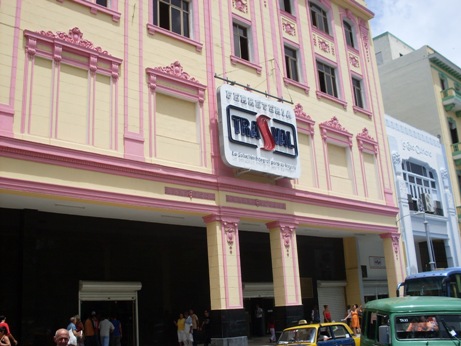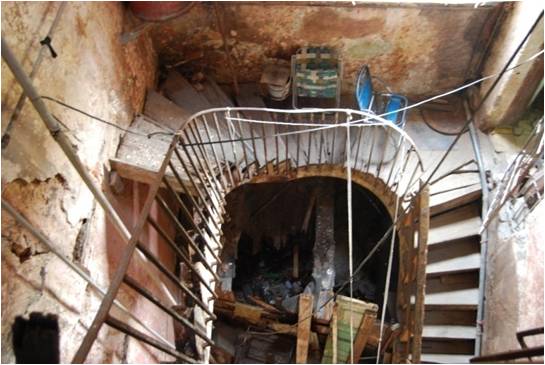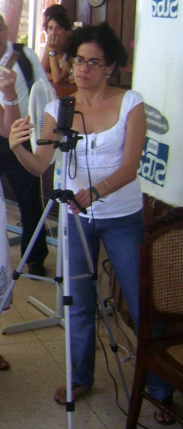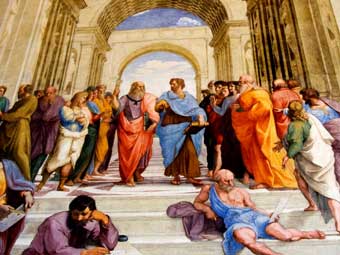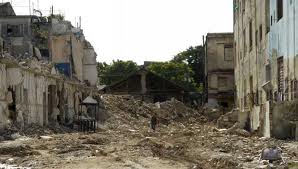 For a moment I thought it would pass without incident, that the funeral procession would arrive without mishap to the Columbus Cemetery and the remains of the winner of the Sakharov Prize for Human Rights, Oswaldo Paya Sardinas, would be laid to rest in peace.
For a moment I thought it would pass without incident, that the funeral procession would arrive without mishap to the Columbus Cemetery and the remains of the winner of the Sakharov Prize for Human Rights, Oswaldo Paya Sardinas, would be laid to rest in peace.
From my place in the long line of vehicles, perhaps because we had 16 or 17in the column, we noticed that something happened at the head of the line, which stopped without those in the back knowing exactly happened. Several minutes later the march was resumed.
Upon arriving at the cemetery and realizing the absence of Antonio Rodiles, director of Estado de SATS and friends traveling with him, I inquired about them. So I knew what had happened: a great fight in Calzada del Cerro, with the violent intervention of the police with fists and truncheons, and the arrest of about fifty people, all opponents of the regime, and put in a bus belonging to the Armed Forces, that just happened to be there, they were taken to police unit Tarara.
Once back in my house, I prepared to go in search of the missing, when Antonio’s mother called and told me that, apparently, he and other friends were detained at the Fourth Police Station at Infanta and Manglar in neighborhood of Cerro. I told them I would meet her and her husband, already there.
Again we started to run up against those who say the country’s laws, the members of the Department of State Security.
On reaching the station of the People’s Revolutionary Police (PNR), no one outside yet knew what was going on. I decided to find out if Antonio and other friends were really there. I talked to the duty officer, with a rank of Major. He looked for a paper he had and told me THESE PEOPLE ARE NOT ON THE LIST OF THOSE DETAINED.
I then told him they could have been brought to this police station by State Security Agents. He made a call. After hanging up he confirmed to me that yes, they were detained there.
The reasons why the political police had brought many of the arrested to the national police stations instead of taking them to one of their own facilities, are not very obvious, although there are many versions. What is clear to us is that Article 244 of the Criminal Procedure Act provides:
Upon the arrest of any person a written report to record the time, date and reason for detention as well as any other particular of interest shall be prepared. The report will be signed by those acting and the detainee.
When, about ten o’clock at night, the independent journalist Julio Aleaga was released, we learned they never filled out an Act of Detention. Nor was this done with Ailer González Mena or many other detainees.
When they did it, in the morning for Antonio Rodiles, the Act of Detention tried to justify the arrest as “in the interest of CI” (Counterintelligence).
I could be wrong, but I think this latter was due to our having already pointed out to the PNR and State Security officials with whom we spoke precisely about the absence of such Acts, making the arrests illegal and saying that the detainees should be released immediately.
From the beginning there were two things that were obvious to all of us citizens who met in front of the police station in solidarity with the detainees:
1) That the PNR of that station was not very pleased with what happened there. The treatment of its officers toward us was measured, correct, without being overbearing, never disrespectful and tried all the time to find a solutions that was, as far as possible, without violence and in a negotiating framework.
We can not say the same for the State Security agents involved.
2) The level at which decisions were made regarding what happened there was always elsewhere, much higher, and where the regulations established in a simple little article of the Criminal Procedure Act do not seem to have, in truth, any relevance.
August 24 2012


